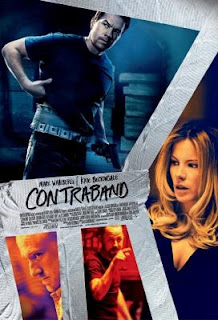Review best Contraband [2012] | poetslandscape

IMDb list -
http://www.Imdb.Com/call/tt1524137/
CNS/USCCB evaluation -
http://www.Catholicnews.Com/facts/films/12mv004.Htm
Roger Ebert's assessment -
http://rogerebert.Suntimes.Com/apps/p.C..Dll/article?AID=/20120111/REVIEWS/120119998
Contraband (Universal, directed by Baltasar Kormákur, screenplay by Aaron Guzikowski, based on the film Reykjavik-Rotterdam by Arnaldur Indriðason and Óskar Jónasson) is a so-so crime thriller largely about the wages of sin. In as much as it focuses on this theme, it's probably a worthwhile movie even if near the end the film, (spoiler alert) its makers chose to go, IMHO inappropriately, the way of the "happy Hollywood ending."
Even if as Christians, we actually dogmantically believe in the ultimate "happy ending," IMHO it just doesn't fit well here or at least not as "easily" as it plays out in this film. Nevertheless, the first 90% of the movie is definitely a cautionary tale almost counting-out the reasons why one shouldn't get involved in crime: (1) things rarely go as planned, (2) one signs away one's life when one gets involved in this way of life, (3) innocents inevitably get involved, and (4) it is really really hard to walk away from the consequences of one's past. These are all very good things to remember when one's tempted to "step off the reservation" and walk-over to "the dark side."
Very good, so how does this particular story play out? Substituting New Orleans and Panama City for Rotterdam and Reykjavik respectively, the film begins with Andy (played by Caleb Landry Jones) the young "loser" brother-in-law of former smuggler turned-legit Chris Farraday (played by Mark Wahlberg) finding himself "way over his head" trying to run a bag worth of drugs into the country on a New Orleans bound freighter for a coked-up two-bit low-life mobster named Tim Briggs (played by Giovanni Ribisi). When the huge container-ship freighter gets boarded by customs officials as it approaches New Orleans, Andy panics and throws the bag containing about $700,000 worth of cocaine into the Mississippi River.
All things considered, it's actually a petty amount but $700 grand is far, far more than most regular people have and so Tim Briggs trying to enforce discipline threatens to kill Andy, and more to the point, Andy's sister, Chris Farraday's wife, Kate (played by Kate Beckinsale) along with her and Chris' two small children unless he gets paid for the lost coke. That of course, forces Chris along with Chris' former smuggling buddy Sabastian (played by Ben Foster) "out of retirement" to try to "fix things." Much ensues ...
As the movie plays out, one's reminded of arguably much better films like The Firm [1993] and Shawshank Redemption [1994]. However, what I found intriguing about Contraband is precisely that it is about dark pasts and the film's obvious reminders (over and over again) of how hard it is to simply walk away from such pasts in the future. The Firm, after all was about a young lawyer who simply, perhaps too naively walked into the wrong Firm when he took his first job. In Shawshank Redemption, the lead protagonist got drunk and in a fit of passion _may_ have killed his wife after catching her with another man. Here Chris Farraday had been a criminal who had _luckily_ never gotten caught, and now was being sucked "back into the business." Thus Farraday is far less sympathetic of a character than the principal protagonists of either of the other two films. And yet one does feel for him as he tries really, really hard to walk (and remain) away from crime and become (and remain) legit.
Indeed, the film uses the device of having one of the main characters, Faraday's buddy Sebastian, going to AA meetings, presumably fighting alcoholism to draw the comparison between addiction to alcohol and being trapped in a life of crime.
I applaud this comparison and wish to extend it one step further: Thanks to the relatively awful recent film The Devil Inside, I've had to talk to young people at my parish about the topic of demonic possession again. And this time I suggested that one good thing about this recent movie was that it implicitly raised the point that the people who one should really be really be worried about are not the tormented, contorted, strange language speaking people usually portrayed by films about demonic possession.
Rather, one should be concerned about mass murderers and so forth. And I suggested to at least one group of young people since that movie came out that someone like Saddam Hussein could perhaps have been considered as having been "demonically possessed." True his head was never known to have been "spinning around" and all that. However, he did "cross a line" at some point in his life (he chose to send a person or two to their deaths to amass more power) and it proved to be a trap -- In order to continue to live, Saddam came to be forced to continue to kill more and more people. How's that for "surrendering one's soul to the Devil," becoming "possessed by the Devil" and remaining so trapped until one's death?
I submit that this movie about Chris Farraday is much the same,even if Chris had been a much smaller criminal than Saddam Hussein. Still it proved far harder than Chris would have thought for him to walk away from his previous life of crime.
So even though (spoiler alert again...) the film ends in a needlessly "tidy" way, for most of the film Contraband gives the viewer plenty of material to reflect about should one be tempted to enter into a life of crime: It's really, really easy to fall that kind of life (to fall into Sin). It's much, much harder to be able to get-out.
<< NOTE - Do you like what you've been reading here? If you do then consider giving a small donation to this Blog (sugg. $6 _non-recurring_) _every so often_ to continue/further its operation. To donate just CLICK HERE. Thank you! :-) >>











Comments